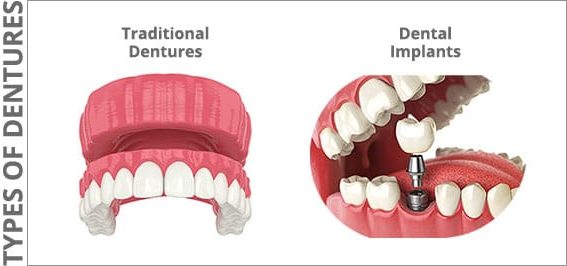Pros and Cons of Dental Implants and Traditional Dentures

It is natural to feel self-conscious and distressed after losing a tooth. You have two options for restoring some of the functionality and appearance of your natural teeth:
- Dentures
- or Dental implants
Numerous factors must be considered before selecting one of these restorations. Therefore, we have examined the advantages and disadvantages of each solution for you in this article.
However, if you’ve already decided on your preferred restoration, take a look at our specialists:
- Dr. Nazeri for dentures
- Dr. Reshad for dental implants
They each have three decades of experience using these techniques to treat patients.
By reading on, discover the advantages and disadvantages of conventional dentures versus dental implants (see also Implant surgery is a modern alternative to traditional dentures.)
DENTAL IMPLANTS
When would we recommend dentures over implants?
We will recommend dentures if:
A) You prefer an initially less expensive solution. Yet, it is important to consider that dentures are more costly in the longer term. This is because you will need to replace dentures every few years, and you will need to use cleaning solutions daily.
B) You are concerned about the invasiveness of dental implants. The surgical intervention to place the screw in the jawbone requires some healing time.
C) You want a quick solution. You can expect dentures within 2-6 weeks. Getting a dental implant instead requires a longer commitment. Dental implant surgery requires one or several visits, depending on your mouth and jawbone condition.
The whole dental implant process usually takes anywhere from 4 to 6 months. This period goes from the day of the first consultation until the dental implant is finally completed. You must wear a protective cover for a few months to protect the implant while it heals and bonds with the bone.
When would we recommend dental implants over dentures?
A) When you want something durable that may last many years, possibly even a lifetime.
B) When you prefer a fixed prosthesis rather than a removable prosthesis.
C) When you want to replace your missing teeth with a solution that looks just like your natural teeth (implants) versus something that looks very close to your natural teeth (as in the case of dentures).
D) When you want to be able to eat any food and if you are concerned that dentures may trap food. Dental implants will fully restore your chewing ability. Dentures, instead, will restrain it, especially in the presence of hard and sticky foods.
E) When you want to avoid the hassle of regularly taking out your dentures to clean them with special solutions. If so, you will prefer dental implants since they are cared for just like normal teeth.
F) When there are no healthy teeth to support dentures for healthy teeth may be required to support dentures.
G) When you have healthy teeth but are concerned that dentures will harm them. If this concerns you, choose implants because they do not require healthy teeth to support them.
H) When you want to avoid the risk of dentures interfering with your speaking ability. Implants do not suffer from this issue.
I) If you are concerned about loose dentures (implants are anchored in the bone).
J) If you are uneasy about using special creams and adhesives to manage your dentures (again, implants have none of these problems).
Decades of experience treating patients with missing teeth in the heart of Manhattan
This article may have helped you decide on a restoration. But do you still have questions about how to solve your problem?
If so, get in touch with us today to schedule an appointment and learn more.
Our dentists have each worked in the field for 30 years. So, you can clear up any confusion if you talk to them.
SUTTON PLACE DENTAL ASSOCIATES ON THE WEB






